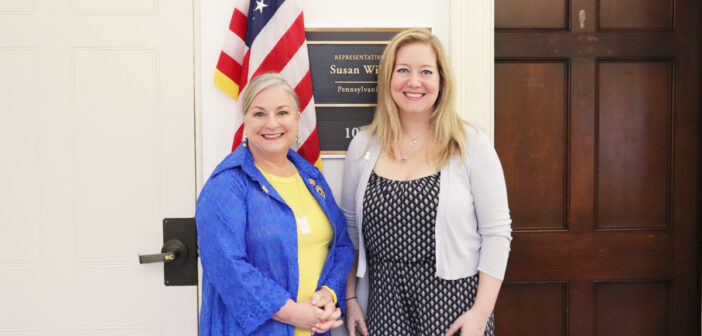Christie Nicas, a Bethlehem resident who had two of her three children through in vitro fertilization, was invited by Rep. Susan Wild to the State of the Union. She has been working on a bill to protect access to IVF and other assisted reproductive technology through her Family Building Act.
The Alabama Supreme Court ruled Feb. 20 the Wrongful Death of a Minor Act applied to all unborn children, even frozen embryos resulting from IVF treatments. This ruling brought IVF to the forefront of national conversation, leaving many with questions regarding the treatment’s future.
President Joe Biden addressed the topic during his State of the Union address March 27 when he called for Congress to protect the right to IVF.
Each year, elected officials, like Wild, bring guests to the address. These guests are chosen to represent issues and bills the official cares about.
When Nicas received her invitation to the State of the Union address, she said she was honored. She said she’s never been shy about her struggle with infertility and was excited to represent her own family and others who share a similar journey.
“A lot of people don’t necessarily talk about their process — infertility — and how they’re having trouble or not conceiving their children,” Nicas said. “I’ve never been like that. I’ve always kind of been an open book, so friends and family and colleagues all know that I’ve gone through IVF to have two out of my three children.”
Other guests present affected by IVF included Latorya Beasley (invited by First Lady Jill Biden) and Elizabeth Carr (invited by Sen. Tim Kaine).
During his speech, President Biden addressed Beasley, an Alabama resident who had one child through IVF but could not get treatment for a second pregnancy after the state’s ruling.
He used her story to call for Congress to protect the right to IVF.
Wild’s bill, which she has been working on since 2021, would codify this right and ensure IVF and other assisted reproductive technologies are legal nationwide.
She began the bill after the Dobbs v. Jackson Women’s Health Organization ruling overturned Roe v. Wade. She said she saw a connection between the ruling and access to treatments such as IVF.
“As soon as I read the entire Dobbs decision, including Justice Thomas’s concurring opinion, I sort of immediately flagged that IVF, because of the methodology used in IVF, could absolutely be on the chopping block among the fervent anti-abortion Republicans,” Wild said.
While abortion and assisted reproductive technology are different treatments, arguments about the status of fetuses and embryos surround both.
In IVF therapies, eggs and sperm are collected and combined in-lab to create embryos. These embryos are then frozen and stored until implantation when the embryo is placed in the uterus for gestation.
Wild said more embryos are created than needed, so disposing of the excess can have legal implications under rulings where embryos are protected as people.
“The Alabama Supreme Court decision just obviously put this front and center,” Wild said. “In that sense, I guess they’re helping my bill along.”
While the treatment is legal and available in Pennsylvania, Wild’s bill would ensure this right nationally. Even in-state, however, IVF can be hard to access for many families.
Nicas and her husband were quoted between $28,000 to $32,000 for IVF. She said she was only able to pursue the treatment because she qualified for a medical research study that paid part of the cost and from the financial support of family and friends.
Dr. Stephanie Estes, a reproductive endocrinology and infertility specialist at Penn State Health, said IVF is not covered by many insurances in Pennsylvania, so the costly and lengthy process is not an option for many of the couples she treats.
“In Pennsylvania, we have a lot of patients who stay with therapies that are less expensive but less effective, and then they can’t move forward with IVF because of cost,” Estes said. “That’s just very sad to see, because in my mind I know of a therapy that could have a better result for them, but they can’t access it.”
Barriers to access are even steeper in other states. In Alabama, some clinics have shut down over fears of legal action against IVF patients and practitioners. Access still remains uncertain without national protection.
Wild’s bill to ensure access nationwide currently has 151 co-sponsors and awaits voting in the House of Representatives.






Comment policy
Comments posted to The Brown and White website are reviewed by a moderator before being approved. Incendiary speech or harassing language, including comments targeted at individuals, may be deemed unacceptable and not published. Spam and other soliciting will also be declined.
The Brown and White also reserves the right to not publish entirely anonymous comments.